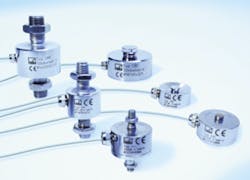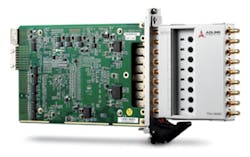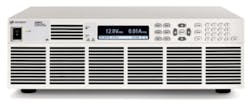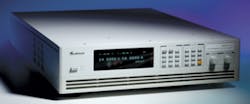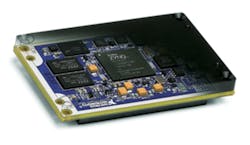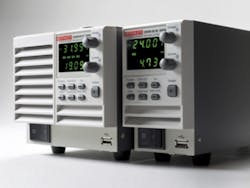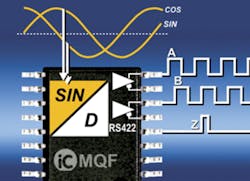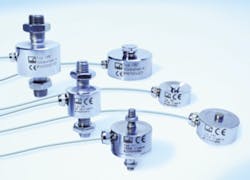PCI Programmable-Resistor Cards
The PCI RTD Simulator Cards (50-262) contain six resistance channels each with exceptional resistance stability and fine setting resolution. Intended for the emulation of PT100 and PT1000 resistive temperature sensors, the 50-262 PCI RTD simulator is offered with two resistance ranges: 90 Ω to 250 Ω and 900 Ω to 2,500 Ω; the PT100 version provides an 8-mΩ setting resolution.
The PCI Strain Gage Simulator Cards (50-265) have six bridge channels; each channel simulates a strain gage bridge. Four models are available in the 50-265 PCI strain gage range; they include 350-Ω, 1-kΩ, 2-kΩ, and 3-kΩ bridges. Pickering Interfaces
The PXIe-9848H eight-channel, 14-bit 100-MS/s high-speed PXI Express digitizer provides both a high input voltage range of ±100 V and high dynamic performance to support measurement-range expansion in a PXI system. The digitizer is suitable for an array of applications in automotive control, power-supply testing, and scientific research.
The PXIe-9848H’s signal-conditioning module features eight simultaneous analog inputs and a 15:1 or 50:1 attenuation ratio. Dynamic performance is 63.5 dB SFDR and 55.5 dB SINAD. In addition, the PXIe-9848H provides software-selectable input impedance, overvoltage protection, and AC/DC coupling. ADLINK Technology
The AC6800 Series, a family of basic AC power sources that delivers stable, reliable power for testing electronic devices during design and manufacturing, includes four models from 500-VA to 4,000-VA output power. The AC6800 basic AC power sources offer intuitive user interfaces that make it easy for engineers to access and view setup and measurement information directly from the front panel or programmatically via SCPI commands.
The AC6800 Series sources come standard with LAN/LXI Core and USB interfaces. An optional GPIB interface also is available. The LXI Core interface enables engineers to set up and control the power supplies remotely via a standard web interface. Users can add an optional analog input board to enable adding basic transient waveforms to their sources. From $3,498. Keysight Technologies
The 62020H-150S 150-V/40-A/2-kW programmable DC power supply with solar array simulation (SAS) is a 2-kW addition to the company’s line of programmable DC power supplies designed for PV inverter testing. It provides simulation of open-circuit voltage up to 150 V and short-circuit current up to 40 A. The 62000H-S offers high power density in a 2U high package. The 62000H-S series instruments include fast and precise digitizing measurement circuits with a 100-kHz A/D, 25-kHz D/A-controlled I-V curve and a digital-filter mechanism. The instrument can simulate an I-V curve accurately and respond to the mains ripple effect from the PV inverter.
To help test the array’s I-V curve output influence of various weather conditions such as irradiation, temperature, rain, and shade, the unit can store up to 100 I-V curves in the simulator memory—from early morning to nightfall. Chroma Systems Solutions
NI SOM combines the Xilinx Zynq All Programmable system on a chip (SoC) with supporting components such as memory on a small PCB and features a complete middleware solution and a Linux-based real-time operating system already integrated. The NI SOM gives design teams the customizability of a system-on-module without the increased time and risk of developing custom software.
The NI SOM enables design teams to deploy reliable, complex embedded systems faster because it is based on and has the same design standards as the LabVIEW reconfigurable I/O (RIO) architecture. This architecture already has been used in high-reliability applications such as unmanned aerial vehicles and cataract surgery machines. National Instruments
The Series 2260B programmable DC power supplies include two 360-W and two 720-W models. The Series 2260B family is designed for benchtop, embedded, and manufacturing test applications that demand higher power and performance.
The 360-W Model 2260B-30-36 and Model 2260B-80-13 supplies are capable of sourcing a wide range of voltage and currents. For applications with higher power requirements, the Model 2260B-30-72 and the Model 2260B-80-27 can output up to 720 W. Depending on the model chosen, Series 2260B power supplies can source up to 80 V or 72 A. They offer LAN and USB connectivity and an optional GPIB interface. From $1,420 to $1,880. Keithley Instruments
Employing an interpolation method for optical and magnetic length gages featuring decimal gratings, the iC-MQF incorporates a signal-conditioning analog front end, a vector-tracking converter for real-time conversion without latency, and fault-tolerant RS-422 driver stages.
Differential or referenced input signals from a few millivolts upwards can be connected, such as those coming from MR bridge sensors or photo sensors, for which a low impedance also can be selected. A ready-to-operate demo board with a GUI (PC software) is available for sampling; a device DLL is optional to support production tools. $9.79 in 1,000-unit volumes. iC-Haus
The U9C and C9C lines of flexible miniature force transducers are highly accurate and come in more than 480 different configurations. U9C force transducers measure static and dynamic tensile and compressive force while C9C force transducers can be used to measure static and dynamic compressive force. Both are available in 10 measurement ranges from 50 N to 50 kN.
Their small size (26-mm diameter) makes the U9C and C9C transducers easier to install than larger sensors, but their 0.2% accuracy allows them to be used in many applications that previously required the use of larger sensors. The transducers are made from stainless steel and are hermetically sealed to protect against dust and water to meet the IP67 standard, making
them suitable for applications outside the lab. HBM
Protocol Simulation and Conformance Test Tool
The Message Automation and Protocol Simulation (MAPS) test tool, which supports a variety of wireless, IP, and TDM protocols, has been enhanced to run as a true 64-bit application. The 64-bit version improves the signaling simulation performance to overcome the limitation of only 2-GB application memory in 32-bit processors.
The application includes various test plans and test cases to support the testing of real-time entities. Along with automation capability, the application gives users the unlimited ability to edit messages and control scenarios (message sequences). A new scheduler feature helps users automate the testing process. GL Communications
An integrated XJFlash feature allows engineers to automatically generate customized programming solutions that can overcome the speed limitations generally associated with using boundary scan to program flash memories connected to FPGAs. By creating custom programming designs for each flash/FPGA combination, XJFlash relieves the JTAG chain of unnecessary traffic (usually generated by repetitive functions such as shifting in control, address, and data bits). By doing so, programming speeds close to the device’s theoretical maximum can be achieved.
Previously only available as a consultancy service, the XJFlash module supports a range of flash and FGPA configurations, and it can be used as part of an XJDeveloper boundary-scan test project by the end user to create a programming solution. XJTAG
